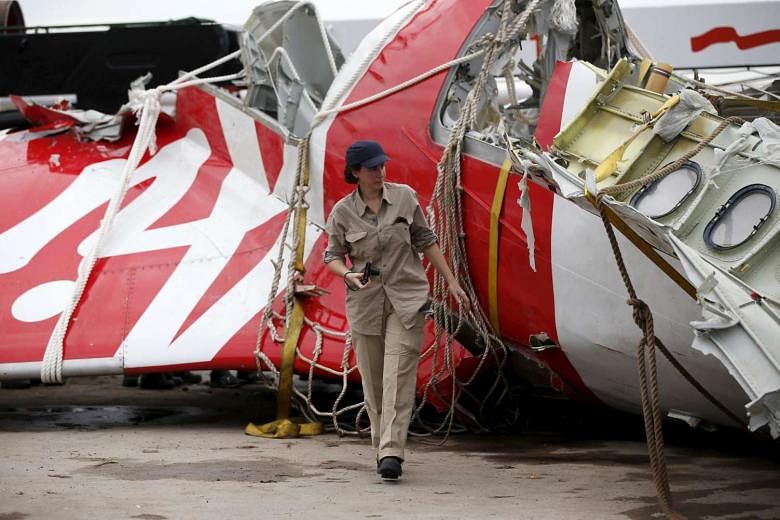JAKARTA - A confluence of technical faults in an AirAsia passenger jet that the flight crew could not resolve in mid-air led to the crash of flight QZ8501 last December, killing all 162 people on board, an investigation report released by Indonesia on Tuesday (Dec 1) has revealed.
A probe by the National Transportation Safety Committee (KNKT) found that the aircraft's Rudder Travel Limiter (RTL), which assists pilots to control the rudder of the plane, had failed repeatedly after a loss of electrical power.
The pilots had tried to resolve the issue according to procedure but was unable to do so because of the "electrical interruption" to the flight augmentation computer (FAC), causing the autopilot to disengage.
The Airbus A320, while in manual flight, subsequently stalled and crashed, killing all on board.
The KNKT said it examined the aircraft's maintenance record as well as the recovered flight data recorder (FDR) during its investigations.
It said weather conditions did not affect the aircraft, according to data from the flight recorder.
However, an examination of the aircraft maintenance record uncovered 23 occurrences of the RTL "system problem in the last 12 months".
"The problem was initiated from the crack soldering on the electronic card of the Rudder Limiter Unit," said the KNKT.
The agency's lead investigator Nurchayo Utomo said the soldering may have cracked due to extreme temperature changes as the aircraft moved between land and air.
The agency's probe involved its counterparts from Australia, France, Singapore and Malaysia.
The report is the first official explanation on why flight QZ8501 disappeared from radar, after the KNKT declined to publish its preliminary report.
The Airbus A320 crashed into the Java Sea on Dec 28 last year, less than halfway into a two-hour flight from Indonesia's second-biggest city of Surabaya to Singapore.
In response to the report, AirAsia chief executive Tony Fernandes thanked the KNKT for its "very thorough investigations", adding that his thoughts were with the families and crew who still remained the airline's number one priority.
"These are scars that are left on me forever but I remain committed to make AirAsia the very best. We owe it to the families and my crew," he wrote on his Twitter account on Tuesday (Dec 1).
"There is much to be learned here for AirAsia, the manufacturer and the aviation industry. We will not leave any stone unturned to make sure the industry learns from this tragic incident," he said. "My heart and deep sorrow goes out to all the families involved in QZ8501."


